France


UK

Sweden

Finland

EU Parliamentarian Valérie Hayer







One of our local landmarks, Table Rock park, has been on fire for over a week now. Over 10.000 acres have burned.
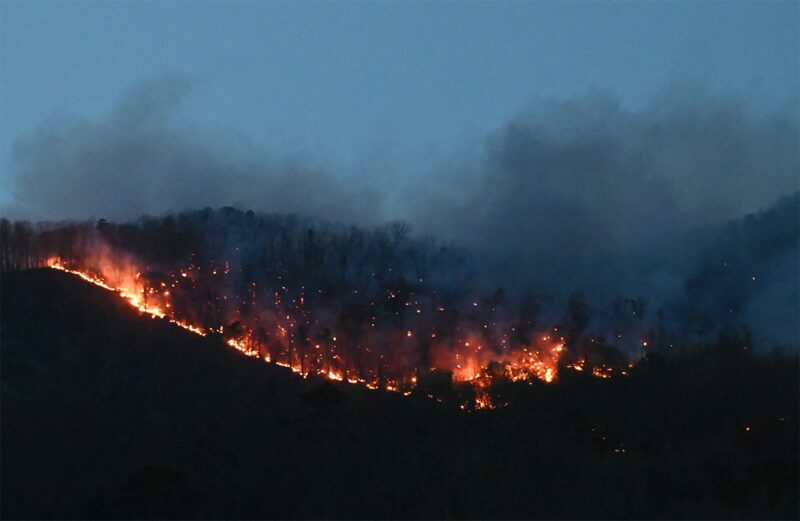
And today it finally rained.

Spending a good bit of the evening working on another, short-term writing project and then reading about Trump’s latest shenanigans (if only that weren’t an application of the literary device of understatement) leaves me with little time, energy, or interest to write about my day, to share any pictures, to do much of anything other than take a deep breath and spend the last few minutes before my 11:00 bedtime doing anything that doesn’t involve thought…
Yet another cheat to keep a now-thoroughly-compromised streak going.
Every morning, I drive up Mauldin rad until it intersects August. As I cross Augusta, I always catch sight of the strip mall on the corner of Potomic and Augusta and wonder how any of the stores there possibly stay in business.

Many of the shops are vacant, and the few that do have businesses seem so neglected that their demise seems imminent.

And then, out of the blue one morning, the whole thing is gone. A pile of rubble, with only a short a news report about it.
The comment at the end of the report about pushing people out of their homes without giving them any affordable options was likely not a comment about the shopping center but about the neighborhood next to it — the neighborhood that houses my school. There has been noticeable gentrification taking place over the last decade or so. A quick look at Zillow estimated property values in the area tells the story:

During our trips to Florida this summer, I noticed several interesting billboards. Many of them were theological; one was political:
This notion is perhaps the most loaded statement I’ve read in recent memory. It’s certainly the most terrifying.
From the perspective of those who financed the billboard it is a statement about the 2020 election and the ever-persistent myth that somehow the Democrats committed election fraud. The complete lack of evidence for this is no matter: those who hold this view simply acknowledge non-facts as evidence. Those of us firmly grounded in reality are simply and willfully ignorant.
But just what are those catastrophic consequences? Again, from their perspective, it’s multifaceted. First, there’s simply the idea that an unelected individual is currently holding the nation’s highest office. Were that true, it would be catastrophic. But there’s a second notion hiding in that statement: what are people who believe this — in their own eyes, good and God-fearing patriots, one and all — to do about it? A recent article in Newsweek points out that there are renewed calls from the far right for civil war:
[Trump’s post on Truth Social] warning that 2024 will be the new 1776 is in line with other threats of looming civil wars in the U.S. made by Trump supporters following the New York jury verdict on Thursday which found the former president guilty on all 34 counts of falsifying business records in a criminal hush-money trial.
Newsweek
In Boston University’s BU Today, staff members write,
A recent Washington Post headline says: “In America, talk turns to something not spoken of for 150 years: Civil war.” The story references, among others, Stanford University historian Victor Davis Hanson, who asked in a National Review essay last summer: “How, when, and why has the United States now arrived at the brink of a veritable civil war?” Another Washington Post story reports how Iowa Republican Congressman Steve King recently posted a meme warning that red states have “8 trillion bullets” in the event of a civil war. And a poll conducted last June by Rasmussen Reports found that 31 percent of probable US voters surveyed believe “it’s likely that the United States will experience a second civil war sometime in the next five years.”
BU Today
The billboard, then, suggests to informed drivers that a civil war might be the necessary outcome of such Democratic duplicity.
The attempted assassination of Trump will only add to this.
What politicians need to be doing now is talking us back from this brink. Biden and the Democrats seem to be doing this. What will Trump do? Will he try to quell this anger or will he stoke it? I don’t think there’s any doubt about how the man will react.
Those of us who warned friends and family around us who supported Trump in 2016 that he is a dangerous man continually feel more vindicated, but right now, I’d rather be proved wrong.
Those on the far right are quite indignant about Trump’s recent conviction.
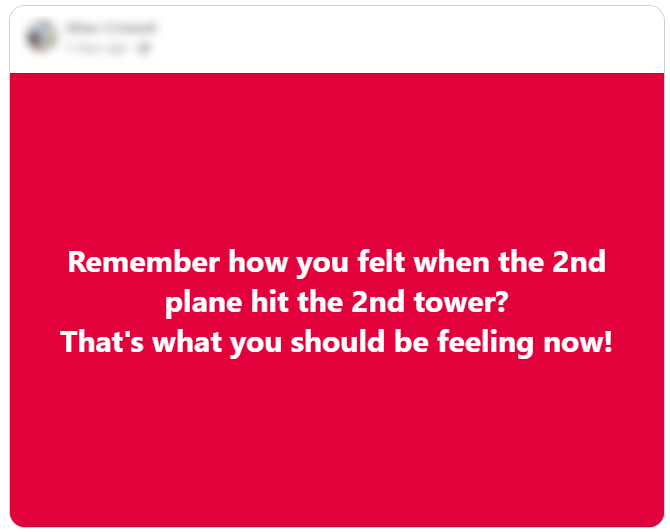
This suggests that America is under attack, and by terrorists no less. We went to war as a result. Some of these people want war as well — a second civil war. Perhaps talking about it could help, so I asked “Why?” when I saw this post. We’re facing an attack from within, came the response.
Another friend, from college, pasted a suggested new American flag on his social media feed:

“Would you be reacting the same way if the ONLY difference was that it was Biden instead of Trump?” I asked.
“That would very much depend on the facts of the case. It’s the whole point, frankly,” he replied.
I clarified my question: “But I’m simply asking if EVERYTHING was EXACTLY the same, with the only difference being it was Biden and not Trump.”
Silence.
The last post really hits at the underlying cultic qualities of Trump devotees.

I forgot to put pictures up from the eclipse yesterday. Our district had an e-learning day (?!?) and so only the teachers were at school.




With Keri Lake taking Trump’s example to heart and refusing to concede an obviously-lost election, I’m afraid we’re seeing what will now be the typical Republican reaction to election loss: deny, deny, deny.
Trump did so much damage to our country, but this Republican denial of reality as a basic election operating principle is the most harmful. It tears at the very foundation of our democratic institutions, and it leads to previously-unthinkable insanities, like the ostensible leader of the party calling for the dissolution of the Constitution and the party saying nothing to condemn such dangerous rhetoric. Republicans have not rejected Trump even when he literally suggested destroying our country.
There is no hope for the Republican party. Just when I think it can’t fall deeper, it does.
It’s a pretty impressive feat of short-sighted hypocrisy that most of the people most opposed to student debt forgiveness are practitioners of a religion that is built upon the idea of a debt being paid undeservedly…
Two images that came through my Twitter feed over the last few days. The first: a rather succinct overview of Trump supporters.

Then a graphic representation of the same idea.

For the last six years now, we’ve watched Donald Trump and over and over thought, “Okay, that’s surely the new low. He can’t sink lower than that.” And then he does. And we all think, “Okay, surely that’s the new low. How could he sink lower?” And then he does.
We watch his cult and wonder, “Will that be the thing that will break some supporters away from him?” And we know it won’t, but then the new low comes, and we think, “Surely they won’t put up with that.” And they do.
So now it appears that Trump had nuclear secrets in his basement, was asked to return them and refused, was subpoenaed to return them and refused. Surely this is the new low. Surely this — just shy of espionage at best — is the breaking point.
Of course, it isn’t.
“Surely, Donald Trump stealing nuclear secrets will be enough to break away Republicans from him.”
if y’all haven’t learned this lesson now you never will.
The man can eat a live baby on national television and not a single Republican voter would give a shit.
Rick Wilson
Lestje B. Juddged elucidated it:
If it’s anything shy of the ACTUAL launch codes, then Fox et. al. will minimize it to the point where the rank and file cultist can buy into it.
And even if it IS actual launch codes, it’s still 90/10 that it doesn’t move the needle a single bit.
Lestje B. Juddged
Tristan Snell framed the significance succinctly:
He did not take a few innocent items for memorabilia. He took the Crown Jewels of classified government documents to his home in Florida.
Tristan Snell
The GOP’s reaction will be predictable, and it will show that the party has become a threat to national security.
I’ve begun The Good Old Days: The Holocaust as Seen by Its Perpetrators and Bystanders. According to the introduction,
The title “The Good Old Days” (“Schone Zeiten” in German) comes from the cover of a private photo album kept by concentration camp commandant Kurt Franz of Treblinka. This gruesomely sentimental and unmistakably authentic title introduces a disturbing collection of photographs, diaries, letters home, and confidential reports created by the executioners and sympathetic observers of the Holocaust.
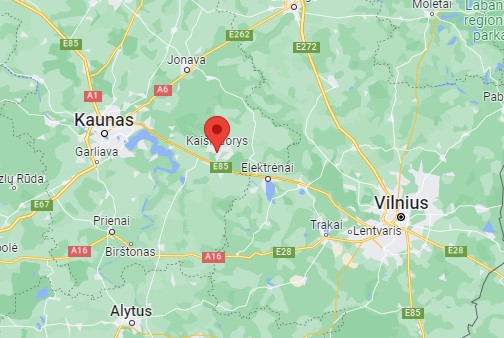 It includes the Jäger Report in full. What is this report?
It includes the Jäger Report in full. What is this report?
The “Jäger Report” is a statistical summary of the killing carried out by the Einsatzkommando 3, a unit of Einsatzgruppe A, between 4 July and 25 November 1941 in the towns and villages of Lithuania and Latvia. It was written by the unit’s commander, SS-Standartenführer Karl Jäger (1888-1959), a member of the NSDAP since 1930 who was 53 years old at the time. As historian Ronald Headland points out, the “Jäger Report” is exceptional among these horrific documents for its “cold-blooded horror” and the “mind-boggling depravity” of its meticulous, morbid cataloguing. “In no other report,” Headland observes, “do we get as detailed a picture of the steady accumulation of victims.” At the conclusion of his report, on page 7, Jäger stated that “the aim of solving the Jewish problem for Lithuania has been achieved by Einsatzkommando 3. There are no more Jews in Lithuania apart from work-Jews and their families,” approximately 35,000 in number, still living in the towns Siauliai, Kaunas, and Vilnius. Note the change that took place at the end of July and the beginning of August: Jäger’s Einsatzkommando begins shooting Jewish children, in addition to adult men and women, and the overall rate of killing increases by a factor of ten: from a total of 4,400 in July to 47,906 in August. Karl Jäger committed suicide in June 1959 while awaiting trial (Source).
 It’s page after page of tabulated columns indicating the date, the location, and the number of victims as Einsatzkommando 3 moved through Lithuania, killing Jews. Two back to back entries stand out:
It’s page after page of tabulated columns indicating the date, the location, and the number of victims as Einsatzkommando 3 moved through Lithuania, killing Jews. Two back to back entries stand out:
| 26.8.41 | Kaisiadorys | All Jews, Jewesses, and Jewish children | 1,911 |
| 27.8.41 | Prienai | All Jews, Jewesses, and Jewish Children | 1,078 |
All the Jews of a given town, wiped out in a single day. And this was long before gassing: these murders were personal, close.

The Einsatzkommandos had to take aim individually at individual people — at men, at women, at children. They were splattered with blood and brain matter at the end of the day.
The world said, “Never again!” when this happened. In a unified voice, we declared, “We will not let this happen again.” And yet it’s happening again, now, in Ukraine. Not to this extent. Not yet.
Why are we letting it happen again? Simple: the man behind all this has a whole arsenal of nuclear weapons behind him. We risk World War 3 if we simply intervene. He’s holding the world hostage as we sit and watch his troops slaughter, rape, and terrorize the civilians of Ukraine.
It’s fairly clear that, in a conventional war without the fear of nuclear weapons, the NATO allies could completely humiliate the Russian army right now. Putin knows that; his troops probably realize it; the world sees it. That’s why he keeps rattling the saber of nuclear annihilation.
And when you realize what, according to some, is the actual motivation behind all this, it’s even more sickening:
What in the middle-school canon might be the perfectly apt reading selections in April 2022? We’re about to begin Diary of Anne Frank in one class and Lord of the Flies in another.
Who would have thought that the barbarity of World War Two would return? Didn’t we all think we, as cultures, as a species, had finally outgrown this? But we haven’t. Why? Because we all have the beast in us?
Our family began watching this series on Netflix. Servant of the People (Слуга народу in Ukrainian) stars Volodymyr Zelenskyy who plays Vasily Petrovych Goloborodko, a high school history teacher who gets somewhat-unexpectedly elected as president of Ukraine. This scene, though — who could have known? Well, the series came out in 2015 and ran until 2019 — Crimea had already been annexed and Russia was already in the Donbas region, so probably the answer to “Who could have known?” is “Well, anyone with common sense…”
Growing up in the eighties, I was aware that we were in the midst of the Cold War, but I never really gave it much thought. The ubiquitous duck and cover practice of the fifties and sixties was nonexistent, and it seemed to me that Sting’s song “Russians” was less a worry about nuclear war and more a song about the simple fact that, because the Russians actually did love their children (they’re human after all), nuclear war was unlikely. Mutually Assured Destruction to my mind seemed to be common sense, and all adults possessed common sense. That’s what it meant to be an adult, I assumed.
With the fall of the Soviet Union, I (and likely most everyone else) assumed that the threat of a nuclear holocaust was at last a thing of the past. The only possibility of a nuclear explosion somewhere on the planet was connected to Islamic terrorism. Communism seemed it would have more reasonable leaders to me, and the fact that at most such terrorists could gain possession of a couple of such devices seemed to offset the relative dogmatic irrationality that accompanies Islamic terrorism.
During the past three weeks, though, I’ve thought more about the possibility of a nuclear world war than I ever have. Probably because it seems more likely than ever. Putin combines the worst of both the Cold-War era Soviet Union (i.e., a ton of nukes) and the warped view of the reality of Islamic extremists (i.e., an alternate view of history complete with totally fabricated “facts” that fuels a contemporary grievance). And he’s backed into a corner. The Russians are inflicting terrible damage, but three weeks in, they still haven’t taken the capital. Russian soldiers are abandoning vehicles daily and the advance seems to be slowed to a near-standstill. If this continues, Russian surrender is the only sensible option, but it’s the one option that so many of us cannot imagine Putin taking.
The thing is, I find myself thinking of this all the time. I’m standing in the hallway, monitoring students as they change classes, and I’m thinking about it. I’m mowing the lawn, and I’m thinking about it. I’m going for a jog, and I’m thinking about it. It’s easy simply to say, “Well, you’re an adult now, and you have children: you have a better grasp of the dangers, and you’re directly responsible for the well-being of two children.”
But this is fundamentally different: Putin is one man. He answers to no one. The premier of the Soviet Union answered at least to the Politburo. There was some sense of accountability. Putin, on the other hand, answers to no one. He’s been holed up in solitude for two years now fearful of Covid and ever worried about a potential coup (allegedly) — he has literally lived in a reality of his own making, and the notions coming from his speeches indicate that his reality and reality reality don’t have much in common.
And so I, like everyone else, go through my normal routine — teaching, running, mowing, laughing, fussing — with a nagging fear just under the surface. A fear that I tell myself is ultimately not founded in reality. “Surely,” I tell myself, “Putin won’t escalate this to the point of no return.”
Evangelicals are all hot and excited about Putin’s attack against Ukraine.
Never mind the ridiculously immoral thought that God is compelling all these people to commit these actions, thereby making him ultimately responsible (so much for the Christian favorite apologetic move to explain the existence of evil, “It’s free-will!”). What’s equally disturbing is his excitement at the thought of what all this means: the rapture must surely be right around the corner. And shortly thereafter, Jesus will return! Hallelujah! Putin, in such a scenario, must launch nukes at some point because almost all life on Earth has to be wiped out (at least in the version I was raised learning), so we must lift our hearts in prayer that Putin will go ahead and order that nuclear attack.
So let’s run a thought experiment. Let’s say Putin does launch a nuclear war. Let’s say it’s worst-case scenario: almost all life is wiped out. Surely in that group of survivors, there would have to be some evangelical Christians. How would they interpret this devastation? Jesus’s return was supposed to be tied into this apocalypse, they might reason. Would they stop believing, though? Would this be proof for them that their rapture idea (at the very least) was faulty?
I don’t think they would stop believing. They would have to explain it somehow, but to suggest that they were wrong all along? It seems unlikely. They might even suggest that a lot of people were raptured just before the explosions vaporized millions. That would mean, though, that they weren’t raptured. That would mean that, despite their convictions about the impossibility of the scenario, they were left behind a la the Tim LaHaye and Jerry B. Jenkins fictional series. But giving up that belief? I think they might even cling to it all the more.
At this point, another line of thought: we’re going to be living under the actual threat of a nuclear holocaust for as long as Putin is alive. But even in his death, he would threaten the world: his successor, if chosen by Putin, would be someone who’s groomed in the same convictions just as happens in North Korea. There is a very real possibility that this successor would have almost identical political views and aims as Putin. In that case, we’re right back in the same situation as the evangelicals: nothing could convince them that their convictions are wrong. Which would mean that the nuclear threat would continue. Which would mean that the evangelicals would continue to find perverse excitement in the situation. Which means it’s all circular…
https://twitter.com/NewsReaderYT/status/1497358183458910210?s=20&t=QF5Jz5ZJbXRKACmBUkDw4Q
https://twitter.com/vikkykim1104/status/1497299831164968966?s=20&t=QF5Jz5ZJbXRKACmBUkDw4Q
https://twitter.com/Aryabhata99/status/1497411546305245191?s=20&t=QF5Jz5ZJbXRKACmBUkDw4Q
https://twitter.com/hanisep1ta/status/1497176302163578881?s=20&t=QF5Jz5ZJbXRKACmBUkDw4Q
There are a lot of things in the world that we might initially fear for no justifiable reason other than something deep within us says, “Run!” There are other things that seem completely harmless and yet can kill. How do we tell them apart?
Fortunately, in nature, evolution provided us with handy indicators: colorful creatures often are creatures we should avoid. Think of a coral snake. Bands of color warn us that this is a creature to avoid. Yet the scarlet king snake has very similar colors as an adaptive measure: it’s harmless, but it looks deadly. We stay away out of an abundance of caution.
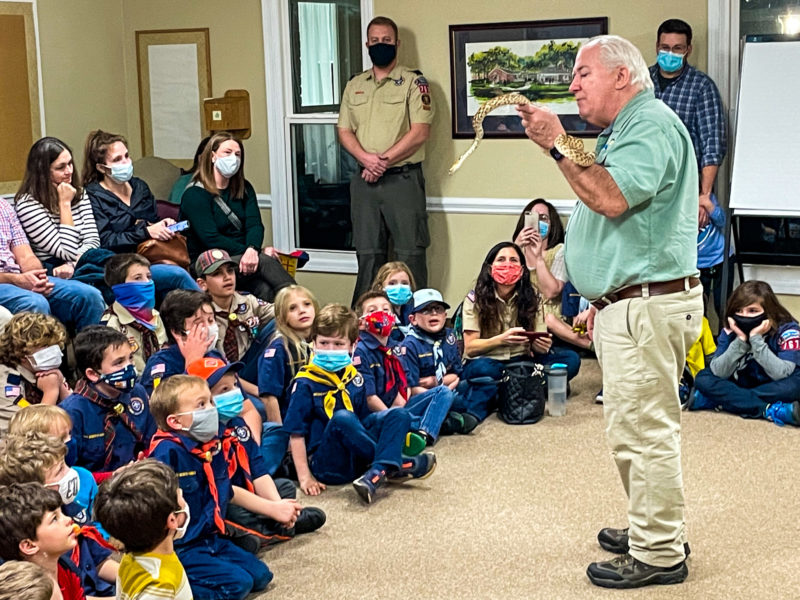
E’s scout pack had their Red and Gold Banquet tonight to celebrate the birthday of scouting. There were the usual scout meeting elements: a flag ceremony, recitation of the scout oath and law as well as the pledge, announcements, and the like There was a pleasant meal with friendly chatter. And there was something new: a visitor who brought a number of animals with him. There were snakes and frogs, insects and lizards, a couple of scorpions, some snakes, and a tortoise. Scouts got to handle some of them but mainly just look. One of the scorpions had venom in its stinger that could kill a human. It, of course, stayed inside its box.
The highlight of the evening was the albino python that required seven minders plus the handler to hold. E got to hold a tarantula, which I thought he might back out of when the moment came. He looked over at me, though, getting a reassuring thumbs-up, he went ahead and conquered that fear.
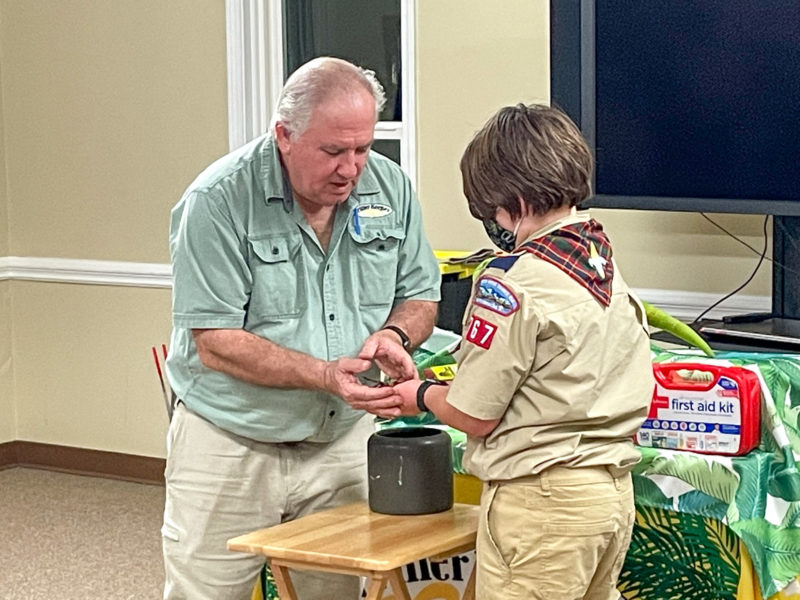
“The legs were hair and tickled a little,” he said on the way home.
Often people are the same as animals: they make clear with their words and actions that they are a threat, that they are someone that others need to deal with early on before things escalate. Russia’s attack on Ukraine was no surprise: Putin puffed out his chest, spread his tail, rattled his tail, flattened his hooded face, hissed, growled, clicked, and grunted, and the rest of us just contented ourselves with the thought that, like the scarlet snake, he only looked dangerous.
But we knew he was dangerous. All his words and deeds showed us that. Now we’re talking about draconian sanctions and such long after the time it could have actually helped. If we’d completely isolated Russia after it annexed Crimea, if we’d made life for its oligarchs all but impossible by completely cutting them off from all access of their incredible wealth held in Western banks and hedge funds, we might have affected some kind of change. But doing that now is a little like signing up for a self-defense course as you hear home invaders breaking down your door: too little much too late.
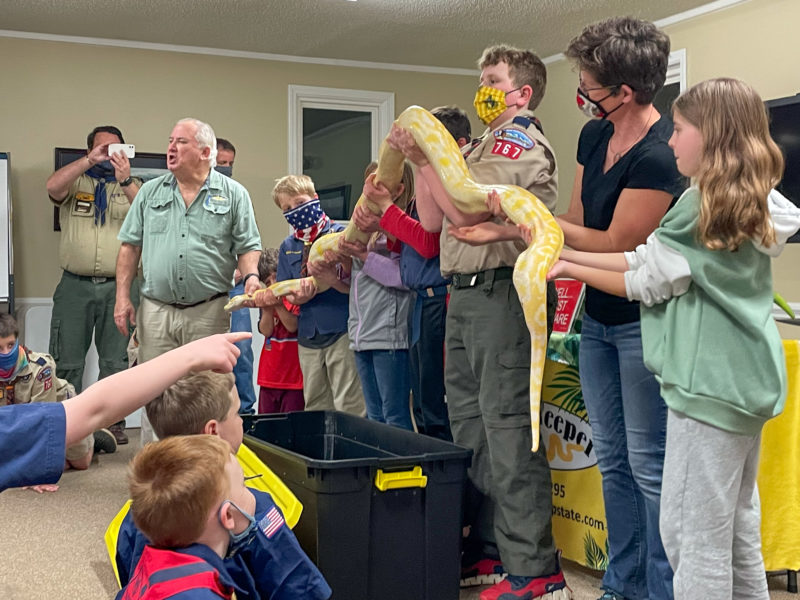
All the media outlets are running stories about how this changes everything, about how this is the greatest threat to Europe since World War 2, about how this will affect Russia and the rest of the world for years to come, and I think that’s an appropriate reaction. However, we should have had that reaction when they annexed Crimea. We should have had that reaction when they attacked Georgia. We should have known what kind of man we were dealing with when Putin began publishing pictures of himself without a shirt, puffing out his chest, riding horses.
It’s no wonder Trump gets sexually aroused just thinking out this guy. He’s everything Trump wants to be. It’s no wonder he’s praising this guy. He’s the cool bully in class that all the pimple-faced asshole bully-wannabes want to hang out with to get a little street credibility.
One year later, the breakdown still doesn’t shock.